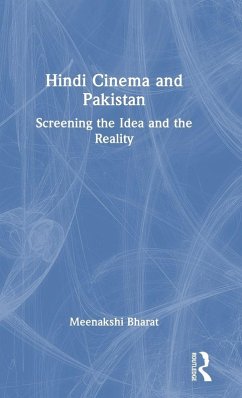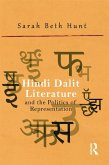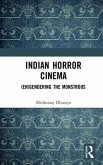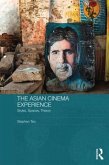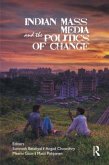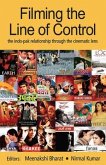- Gebundenes Buch
- Merkliste
- Auf die Merkliste
- Bewerten Bewerten
- Teilen
- Produkt teilen
- Produkterinnerung
- Produkterinnerung
Hindi Cinema and Pakistan traces the genesis and development of this theme in Hindi cinema in the 1950s, showcasing its relevance as a tool that both reflects and shapes how India sees its neighbour, the India-Pakistan relationship, and itself.
Andere Kunden interessierten sich auch für
![Hindi Dalit Literature and the Politics of Representation Hindi Dalit Literature and the Politics of Representation]() Sarah Beth HuntHindi Dalit Literature and the Politics of Representation217,99 €
Sarah Beth HuntHindi Dalit Literature and the Politics of Representation217,99 €![Indian Horror Cinema Indian Horror Cinema]() Mithuraaj DhusiyaIndian Horror Cinema181,99 €
Mithuraaj DhusiyaIndian Horror Cinema181,99 €![Muslim Identity in Hindi Cinema Muslim Identity in Hindi Cinema]() Mohammad Asim SiddiquiMuslim Identity in Hindi Cinema182,99 €
Mohammad Asim SiddiquiMuslim Identity in Hindi Cinema182,99 €![The Asian Cinema Experience The Asian Cinema Experience]() Stephen TeoThe Asian Cinema Experience187,99 €
Stephen TeoThe Asian Cinema Experience187,99 €![Indian Mass Media and the Politics of Change Indian Mass Media and the Politics of Change]() Indian Mass Media and the Politics of Change180,99 €
Indian Mass Media and the Politics of Change180,99 €![The Horror in Hindi Cinema The Horror in Hindi Cinema]() Meraj Ahmed MubarkiThe Horror in Hindi Cinema180,99 €
Meraj Ahmed MubarkiThe Horror in Hindi Cinema180,99 €![Filming the Line of Control Filming the Line of Control]() Filming the Line of Control181,99 €
Filming the Line of Control181,99 €-
-
-
Hindi Cinema and Pakistan traces the genesis and development of this theme in Hindi cinema in the 1950s, showcasing its relevance as a tool that both reflects and shapes how India sees its neighbour, the India-Pakistan relationship, and itself.
Hinweis: Dieser Artikel kann nur an eine deutsche Lieferadresse ausgeliefert werden.
Hinweis: Dieser Artikel kann nur an eine deutsche Lieferadresse ausgeliefert werden.
Produktdetails
- Produktdetails
- Verlag: Taylor & Francis
- Seitenzahl: 196
- Erscheinungstermin: 16. September 2024
- Englisch
- Abmessung: 216mm x 140mm x 13mm
- Gewicht: 386g
- ISBN-13: 9781138334496
- ISBN-10: 1138334499
- Artikelnr.: 70242834
- Herstellerkennzeichnung
- Libri GmbH
- Europaallee 1
- 36244 Bad Hersfeld
- gpsr@libri.de
- Verlag: Taylor & Francis
- Seitenzahl: 196
- Erscheinungstermin: 16. September 2024
- Englisch
- Abmessung: 216mm x 140mm x 13mm
- Gewicht: 386g
- ISBN-13: 9781138334496
- ISBN-10: 1138334499
- Artikelnr.: 70242834
- Herstellerkennzeichnung
- Libri GmbH
- Europaallee 1
- 36244 Bad Hersfeld
- gpsr@libri.de
Meenakshi Bharat is a writer, translator, reviewer and cultural theorist and teaches at the University of Delhi. Her special interests include children's literature, women's fiction and film, and postcolonial, translation and cultural studies-areas which she has extensively researched. She has published The Ultimate Colony: The Child in Postcolonial Fiction, a monograph, Desert in Bloom: Indian Women Writers of Fiction in English, Filming the Line of Control: The Indo-Pak Relationship through the Cinematic Lens, Rushdie the Novelist and children's books Little Elephant Throws a Party and New Friends. Her wide and variegated writing, both creative and critical, is spurred by contemporary concerns. She has co-edited and contributed to five successful Indo-Australian Short Fiction anthologies (Fear Factor: Terror Incognito, Alien Shores: Asylum Seekers and Refugees, Only Connect: Technology and Us, Glass Walls: Stories of Tolerance and Intolerance, Relatively True: Stories of Truth, Deception and Post Truth), which have variously taken on the burning issues of terrorism, asylum seekers, technology and us, tolerance and intolerance, and truth, deception and post-truth. Her monographs Troubled Testimonies: Terrorism and the English Novel in India (2016) and Shooting Terror: Terrorism and the Hindi Film (2020) take on the impact of terrorism on contemporary Indian culture. She served as President of the International Federation of Modern Languages and Literatures (FILLM, UNESCO, 2014-2017), as a bureau member of the International Council of Philosophy and the Human Sciences (CIPSH, UNESCO) and as the Treasurer of the Indian Association for the Study of Australia (IASA) from 2012 to 2016.
Acknowledgements viii 1 Introduction: The Idea of Pakistan in Hindi Cinema
1 2 A Nation Divided: Pakistan and the Partition in Hindi Cinema 15 3 War
Clouds: Pakistan and the Uniform in Hindi Cinema 39 4 Proxy Wars: Pakistan
and Terrorism in Hindi Films 65 5 The Nation at Play: Pakistan and the
Hindi Sports Film 88 6 Loving the Other: Cross-Border Love in the Hindi
Film 112 7 Mending Fences: Humour in the India-Pakistan Hindi Film 135 8
Conclusion: The Reality of Pakistan in Hindi Cinema 159 Filmography 177
Appendix 1 180 Appendix 2 184 Bibliography 186 Index 194
1 2 A Nation Divided: Pakistan and the Partition in Hindi Cinema 15 3 War
Clouds: Pakistan and the Uniform in Hindi Cinema 39 4 Proxy Wars: Pakistan
and Terrorism in Hindi Films 65 5 The Nation at Play: Pakistan and the
Hindi Sports Film 88 6 Loving the Other: Cross-Border Love in the Hindi
Film 112 7 Mending Fences: Humour in the India-Pakistan Hindi Film 135 8
Conclusion: The Reality of Pakistan in Hindi Cinema 159 Filmography 177
Appendix 1 180 Appendix 2 184 Bibliography 186 Index 194
Acknowledgements. Introduction: The Idea of Pakistan in Hindi Cinema 2. A Nation Divided: The Partition in Hindi Cinema 3. War Clouds: Pakistan and the Uniform in Hindi Cinema 4. Proxy Warring: Pakistan and Terrorism in Hindi Films 5. The Nation at Play: Pakistan and the Hindi Sports Film 6. Loving the Other: Cross-Border Love in the Hindi Film 7. Mending Fences: The Use Humour in the India-Pakistan Hindi Film 8. Conclusion: The Reality of Pakistan in Hindi Cinema. Filmography. Appendix 1. Appendix 2. Bibliography
Acknowledgements viii 1 Introduction: The Idea of Pakistan in Hindi Cinema
1 2 A Nation Divided: Pakistan and the Partition in Hindi Cinema 15 3 War
Clouds: Pakistan and the Uniform in Hindi Cinema 39 4 Proxy Wars: Pakistan
and Terrorism in Hindi Films 65 5 The Nation at Play: Pakistan and the
Hindi Sports Film 88 6 Loving the Other: Cross-Border Love in the Hindi
Film 112 7 Mending Fences: Humour in the India-Pakistan Hindi Film 135 8
Conclusion: The Reality of Pakistan in Hindi Cinema 159 Filmography 177
Appendix 1 180 Appendix 2 184 Bibliography 186 Index 194
1 2 A Nation Divided: Pakistan and the Partition in Hindi Cinema 15 3 War
Clouds: Pakistan and the Uniform in Hindi Cinema 39 4 Proxy Wars: Pakistan
and Terrorism in Hindi Films 65 5 The Nation at Play: Pakistan and the
Hindi Sports Film 88 6 Loving the Other: Cross-Border Love in the Hindi
Film 112 7 Mending Fences: Humour in the India-Pakistan Hindi Film 135 8
Conclusion: The Reality of Pakistan in Hindi Cinema 159 Filmography 177
Appendix 1 180 Appendix 2 184 Bibliography 186 Index 194
Acknowledgements. Introduction: The Idea of Pakistan in Hindi Cinema 2. A Nation Divided: The Partition in Hindi Cinema 3. War Clouds: Pakistan and the Uniform in Hindi Cinema 4. Proxy Warring: Pakistan and Terrorism in Hindi Films 5. The Nation at Play: Pakistan and the Hindi Sports Film 6. Loving the Other: Cross-Border Love in the Hindi Film 7. Mending Fences: The Use Humour in the India-Pakistan Hindi Film 8. Conclusion: The Reality of Pakistan in Hindi Cinema. Filmography. Appendix 1. Appendix 2. Bibliography

